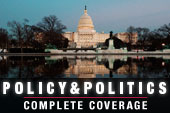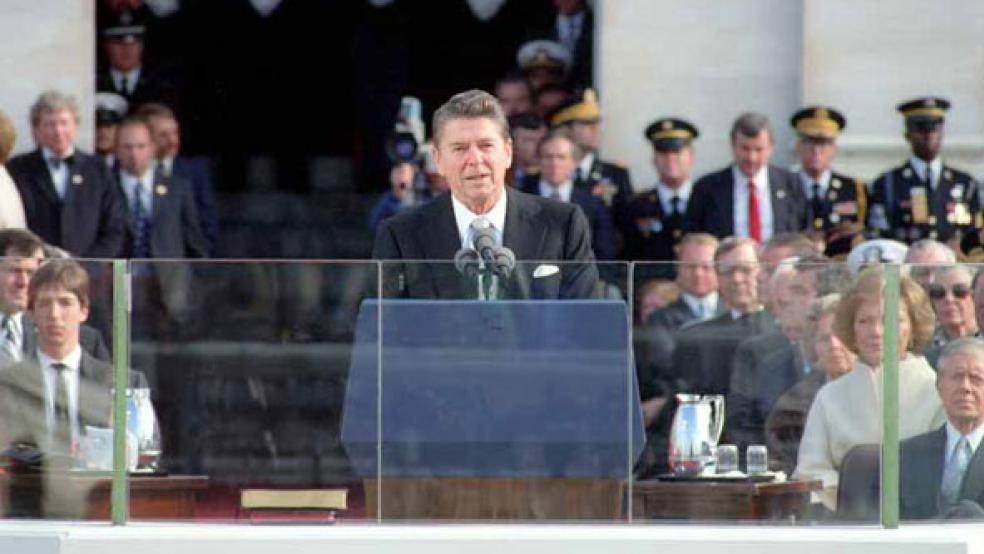Okay, we’re all familiar with such powerful inaugural presidential rhetoric as, “Let the word go forth.....that the torch has been passed to a new generation of Americans,” or “With malice towards none, with charity for all,” or, “The only thing we have to fear is fear itself.”
Those lines come from the inaugural addresses of John F. Kennedy in 1961, Abraham Lincoln in 1865 and Franklin D. Roosevelt in 1933. They have been etched in history and the psyches of the American people.
But how about: “On this day, we gather because we have chosen hope over fear, unity of purpose over conflict and discord.
On this day, we come to proclaim an end to the petty grievances and false promises, the recriminations and worn-out dogmas that for far too long have strangled our politics.’’
Got that?

Good luck finding it in Bartlett’s Familiar Quotations.
It was among the better lines in President Obama’s first inaugural address four years ago, a speech that at the time seemed remarkably powerful to a nation transfixed by the historical moment when for the first time an African-American was sworn in as president. Yet the words that he uttered on the West steps of the Capitol have largely faded from the nation’s collective memory.
For all the attention on the speech, they’re mostly forgettable. The bold pronouncements often carry all the meaning of a greeting card.
University of Virginia political scholar Larry J. Sabato argues that there have been only two truly great inaugural addresses in history – Lincoln’s second and Kennedy’s. And while there were famous lines produced by other presidents dating back to Washington and Jefferson, Sabato said, “By and large, a reading of all of the addresses at one sitting brought on a long winter’s nap; the writing was pedestrian, the topics often picayune, the delivery in the television age usually falling flat.
It came as surprise to many that Obama’s first inaugural speech fit that mold, Sabato added. Not a line of it is particularly memorable or oft-quoted. It lacked the majesty of many of his campaign speeches in which he invoked sweeping themes of the civil rights movement in the vernacular and cadence of a Baptist minister. Still, the emotions of that day were overwhelming and unprecedented crowds descended on Washington to celebrate and bear witness.
For many, the thrill is gone, as Americans have had four years in which to observe Obama in action, as he led the nation through one of the worst economic disasters and recessions in modern history, started to end wars in Iraq and Afghanistan, ordered the commando killing of Osama bin Laden, defeated GOP presidential nominee Mitt Romney in November, and repeatedly clashed with Congressional Republicans over spending and debt issues.
Obama is heading into his second term with considerable momentum and a high approval rating, according to a new Washington Post-ABC News poll. Fully 55 percent say Obama is doing a good job overall, more than double the 24 percent who approve of the job that Republicans are doing.
Presidents typically leave most specifics to the State of the Union speech -- the traditional laundry list of agenda items – Sabato says that maybe that won’t be the case this time. The economy, debt, gun control , immigration reform and terrorism may all become grist for the president’s second inaugural address.
Here are highlights (and a few low lights) from inaugural speeches from the past:
- George Washington’s second inaugural address was so short – just four sentences prior to taking the oath – that it could practically be described as an aside.
- William Henry Harrison in 1841 was the wordiest ever, taking an hour and forty-five minutes in a snowstorm without warm clothing. Harrison died a month later, from pneumonia, but the disease was almost certainly contracted in his third week in office.
- Thomas Jefferson delivered a few memorable lines as he attempted a bipartisan reunification in the wake of the divisive 1800 election, “We are all Republicans, we are all Federalists,” he said. For the record, Jefferson’s Republicans are now “Democrats,” while the Federalist Party died out before the electric telegraph was invented.
- Lincoln in his first address on March 4, 1861 hoped to avoid a full-fledged civil war by appealing to “the better angels of our nature” and urging that the “bonds of affection” between North and South not be broken. His appeal fell flat.
- Franklin Delano Roosevelt delivered his “All we have to fear” speech at the depth of the Great Depression. The March 4, 1933 speech made a huge impression and helped to rally the country at a time when a quarter of the people were unemployed and millions were literally starving.
- Jimmy Carter’s 1977 inauguration is probably best recalled because the former Georgia governor and First Lady Rosalynn Carter stepped out of their limousine in the parade route and walked down Pennsylvania Avenue waving to the crowds. As for the speech, it may have been one of the worst delivered inaugural addresses in the television age. Only Carter’s salute to outgoing President Gerald Ford roused the crowd much.
- Ronald Reagan was deemed the Great Communicator for his gifts as a speaker, but neither of the thespian’s inaugural addresses in 1981 and 1985 produced many memorable lines. The first was overshadowed by the simultaneous release of the American hostages by Iran, the second by weather so frigid that the outdoor ceremonies were canceled and Reagan’s address was given to a small group of VIPs huddled inside the Capitol.
- Bill Clinton delivered two polished addresses in 1993 and 1997 that no one recalls. The Democrat, who took pride in empathizing with average Americans, declared that “In serving, we recognize a simple but powerful truth—we need each other. And we must care for one another. Today, we do more than celebrate America; we rededicate ourselves to the very idea of America.”
- George W. Bush was too weak from the divided overtime election of 2000 to propose anything electrifying in 2001, and he was too divisive and burdened by Iraq in 2005 to bring the country together. But the words of his first speech are now soaked with irony, given the wars and economic meltdown that followed. “Some seem to believe that our politics can afford to be petty because, in a time of peace, the stakes of our debates appear small. But the stakes for America are never small,” Bush said. “If we permit our economy to drift and decline, the vulnerable will suffer the most.”


